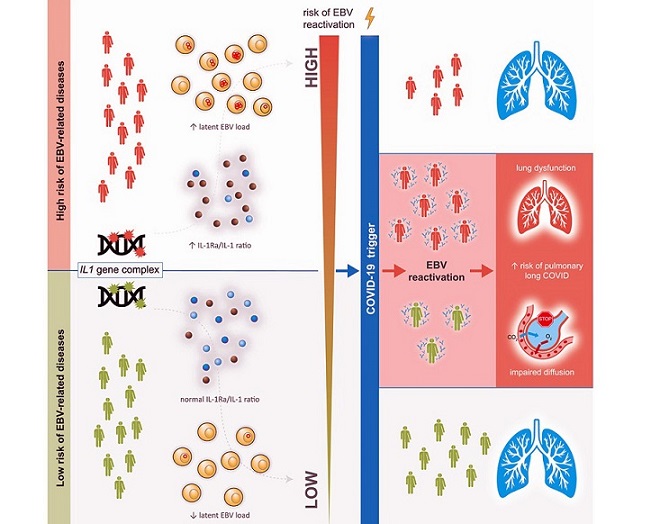Hidden Genetic Flaw Behind Long COVID Lung Damage Exposed by Dormant Epstein-Barr Virus Reactivation
Nikhil Prasad Fact checked by:Thailand Medical News Team Jun 20, 2025 8 months, 3 days, 11 hours, 24 minutes ago
Thailand Medical News: Scientists Discover Link Between Host Genes and EBV Reactivation That Worsens Long COVID Lung Symptoms
A major international study has uncovered how a person’s genetic makeup can make them more vulnerable to reactivation of a common virus—Epstein-Barr virus (EBV)—during a COVID-19 infection, significantly increasing the risk of long-term lung damage in long COVID.
 Graphical Abstract: Hidden Genetic Flaw Behind Long COVID Lung Damage Exposed by Dormant Epstein-Barr Virus Reactivation
Graphical Abstract: Hidden Genetic Flaw Behind Long COVID Lung Damage Exposed by Dormant Epstein-Barr Virus Reactivation
The research was carried out by a team of scientists from Palacký University Olomouc and University Hospital Olomouc in the Czech Republic, in collaboration with VSB-Technical University of Ostrava, Masaryk University, University Hospital Brno, and the Institute of Molecular Biology in Armenia. The study involved 687 individuals who had persistent symptoms four weeks to four months after a SARS-CoV-2 infection and were clinically examined at major pulmonary centers.
These individuals, many of whom had previously only experienced mild-to-moderate COVID-19 symptoms, were found to have objective signs of lung damage, including abnormal chest X-rays and reduced lung function. This
Thailand Medical News report highlights how researchers went further to examine the presence of recent EBV reactivation using sensitive blood tests and explored how certain immune-related genes may be responsible.
What is Epstein-Barr Virus and Why It Matters in COVID-19
Epstein-Barr virus, or EBV, infects nearly 95% of the global population and usually stays dormant. However, it can reactivate when the immune system is weakened—during periods of stress, illness, or in this case, SARS-CoV-2 infection. EBV reactivation can cause inflammation and has been linked to cancers and autoimmune conditions.
In this study, about 23% of long COVID patients showed recent EBV reactivation, which was confirmed through elevated levels of specific antibodies, particularly anti-VCA IgA. This antibody, when present at high levels, proved to be the strongest marker of recent EBV reactivation and was directly associated with significant lung damage—even in people who didn’t report typical long COVID symptoms like breathlessness or fatigue.
Genetic Susceptibility Uncovered
Researchers focused on specific genes involved in the interleukin-1 (IL-1) immune signaling pathway. They identified four genetic variants—located in the IL1A, IL1B, and IL1RN genes—that made individuals nearly twice as likely to experience EBV reactivation during COVID-19. These genes affect the balance between inflammatory responses and anti-inflammatory signals. Carriers of these “risk genotypes” had increased levels of a protein called IL-1 receptor antagonist (IL-1Ra), which dampens inflammation but also weakens the body’s ability to control latent viruses like EBV.
Importantly, individuals with these gene variants not on
ly showed higher antibody markers of EBV reactivation but also had significantly more EBV DNA in their blood, indicating a higher viral load. This elevated load was associated with worse outcomes on chest scans and lung function tests.
No Obvious Symptoms but Silent Damage
The study also revealed a troubling fact: those with recent EBV reactivation didn’t necessarily report more symptoms than others. Many felt fine or had mild complaints, yet imaging showed that their lungs were still suffering. This means EBV reactivation can cause “silent” long-term damage that wouldn’t be picked up unless properly screened.
The findings suggest that EBV reactivation should be considered a serious risk factor in long COVID, particularly for lung health, and that certain people may be genetically predisposed to it.
Conclusions
This landmark study demonstrates that COVID-19 doesn’t just cause direct damage—it can also reactivate hidden viruses in our body, leading to chronic complications. People with specific genetic traits related to the IL-1 immune pathway are more susceptible to EBV reactivation, which in turn is linked to persistent lung abnormalities, even months after recovering from COVID-19. These insights could transform how long COVID is diagnosed and managed in the future, especially for those with unexplained pulmonary symptoms. Future therapies might focus on preventing EBV reactivation or identifying high-risk individuals through genetic screening to mitigate the long-term damage caused by COVID-19.
The study findings were published in the peer reviewed journal: Cell Reports.
https://www.sciencedirect.com/science/article/pii/S2211124725006308
For the latest COVID-19 News, keep on logging to
Thailand Medical News.
Read Also:
https://www.thailandmedical.news/news/high-prevalence-of-epstein-barr-virus-and-other-viral-markers-found-in-patients-with-chronic-fatigue-syndrome
https://www.thailandmedical.news/news/italian-scientists-claim-that-reactivated-latent-infections-are-the-cause-of-long-covid-symptoms
https://www.thailandmedical.news/news/reactivation-of-herpesviruses-like-epstein-barr-virus-and-cytomegalovirus-could-be-causing-long-covid-issues
